As all courses are taught in English, the course is open to foreign students..
Associate laboratory :
-Cancer Research Centre of Lyon UMR INSERM 1052 - CNRS 5286 (CRCL)
-Institute of Light and Matter UMR CNRS 5306 (ILM), Team “Biophysics”
-Convergences Institute François Rabelais (PLAsCAN)
-Laboratory (LMI, Multi-layer material and Interfaces ) UMR CNRS 5615
LabEx DEV2CAN “Cancer development and targeted therapies” (LabEx DEVweCAN until 2019)
- Institute of Nanotechnologies of Lyon,UMR CNRS 5270
- Materials Science laboratory (MATEIS)
- Institute of Chemistry, Biochemistry,Molecular and Supramolecular (ICBMS) UMR CNRS 5246
-Institute for Advanced Biosciences, INSERM U1209-CNRS 5309 (IAB) (UGA, Grenoble)
International lab :
- LIA INSERM CRCL-University of Melbourne “Characterizing intratumour heterogeneity to improve targeting of cancer cell plasticity and self- renewal”
- ELyT School of Tohoku University
- UMI CNRS-UDL-Tohoku University ELyTMaX
- Institute of Fluid Science Lyon Center (LyC, Tohoku University)


















